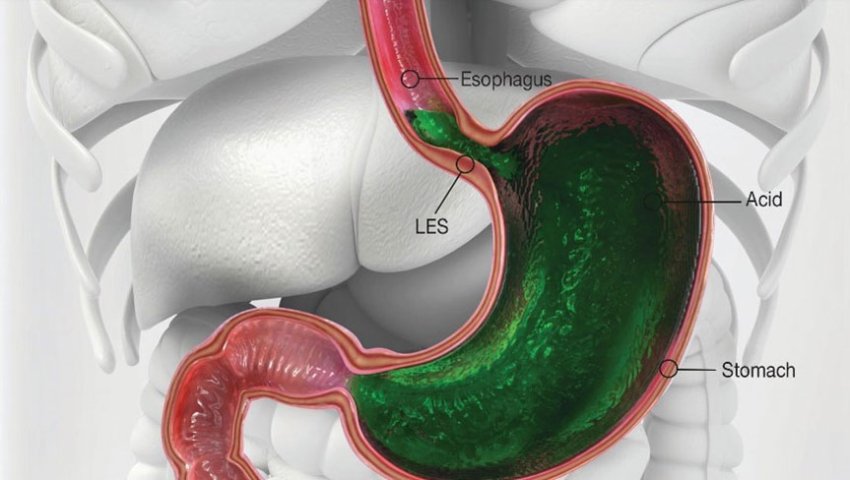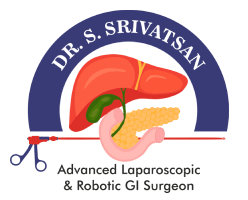
- 29/05/2025
- Dr. Srivatsan Gurumurthy
- 0 Comments
- Blog
Hiatal Hernia and GERD: When to Choose Minimally Invasive Surgery?
Many individuals in Chennai suffer silently from symptoms like heartburn, acid reflux, and bloating, not realising these could indicate more serious conditions like Hiatal Hernia and GERD. If these issues affect your daily life, it may be time to consult the Best hernia surgeon in Chennai. At GEM Hospital, under the expertise of Dr. Srivatsan Gurumurthy, patients receive advanced care using the latest minimally invasive techniques.
Connection Between Hiatal Hernia and GERD:
GERD and hiatal hernia are usually found together. Although GERD is a frequent digestive disorder brought on by acid reflux, a hiatal hernia can be the underlying cause behind it. They should not be overlooked as complications in the long run. If medicines don’t work, surgery can be the best solution. That’s where Dr. Srivatsan Gurumurthy, the top laparoscopic and robotic surgeon In Chennai, comes into the picture.
What Is a Hiatal Hernia?
A hiatal hernia occurs when your upper stomach migrates into your chest via the diaphragm. It may occur as a result of obesity, pregnancy, or persistent coughing. Some hernias are asymptomatic, but some can result in discomfort and reflux.
What Is GERD (Gastroesophageal Reflux Disease)?
GERD is a condition in which stomach acid moves backwards into the oesophagus, causing discomfort, heartburn, or even chest pain. It becomes chronic if it lasts for weeks or months, typically made worse by food or sleeping position.
Difference Between Hiatal Hernia and GERD:
- Hiatal Hernia is an actual protrusion: The stomach and gastroesophageal junction bulge up through the diaphragm into the chest cavity.
- GERD is a functional disorder: Acid contents from the stomach reflux into the oesophagus because of decreased pressure of the lower oesophagal sphincter (LES).
- Hiatal Hernia can lead to GERD: By altering the anatomy surrounding the LES, a hiatal hernia can cause acid reflux and persistent GERD symptoms.
- GERD without Hiatal Hernia: GERD is not caused by hiatal hernia always; other mechanisms could weaken the LES or induce acid reflux.
- Hiatal Hernia entails anatomic alterations: This may result in complications such as shortness of breath, vomiting, bleeding from the gastrointestinal tract, or black tarry stools, which do not commonly occur with GERD in isolation.
- GERD symptoms center on acid reflux manifestations: Symptoms consist of heartburn, chest pain, and regurgitation but typically no vomiting or bleeding from the gastrointestinal tract.
- Pain in the chest and abdomen can happen in both: Although chest pain is typical in GERD, it may also occur in hiatal hernia conditions.
Hiatal Hernia and GERD: How Are They Connected?
The two are frequently connected. A hiatal hernia opens a gap in the diaphragm and allows acid to more easily move upwards. This makes GERD symptoms worse and renders lifestyle modifications or medication by itself less effective.
Symptoms to Monitor for:
- Burning chest pain
- Food or sour liquid regurgitation
- Swallowing difficulty
- Lump in the throat sensation
- Breathing difficulty or tiredness following meals
If these symptoms are persistent, seek not to delay medical care. Hiatal hernia treatment at Chennai is best under skilled surgical care.
When to See a Doctor?
You must see a specialist if you have persistent discomfort or symptoms that disrupt normal living. Warning signs such as black stools, vomit-containing blood, or unintentional weight reduction should not be overlooked. Dr. Srivatsan Gurumurthy provides prompt assessment and advice to make a decision about whether or not surgery is required.
How Doctors Diagnose Hiatal Hernia and GERD?
Diagnosis usually involves an upper endoscopy, barium swallow X-ray, or 24-hour pH test. These tests are used to confirm the diagnosis and assess the severity. It prevents additional complications if diagnosed earlier.
First-Line Treatment: Non-Surgical Management:
Most of the patients start with the non-surgical method. These are:
- Taking smaller, more frequent meals
- Avoiding spicy and acidic foods
- Stopping smoking and losing weight
- Keeping the head elevated while sleeping
Drugs such as antacids, proton pump inhibitors, or H2 blockers may also be prescribed. In the case of seeking GERD treatment in Chennai, one needs to stick to a holistic care program.
When to Opt for Minimally Invasive Surgery?
Surgery is recommended if:
- Symptoms do not improve even with lifestyle modification and drugs
- There is a huge hiatal hernia
- Complications such as Barrett’s oesophagus
- Side effects are caused by long-term drugs
Dr. Srivatsan Gurumurthy has expertise in minimally invasive procedures to allow quicker recovery and shorter hospital stays.
Surgery Options for Hiatal Hernia and GERD:
There are multiple surgical options based on the size of the hernia, the patient’s health, and the severity of symptoms of GERD. The three key methods are:
- Open repair surgery: This is a classic technique in which the surgeon opens a large incision in the chest or abdomen. It could be needed for complicated or recurrent cases, but the healing process takes longer.
- Laparoscopic surgery: This is minimally invasive with little keyhole cuts. A camera and thin instruments are employed to close the hernia and carry out fundoplication. It heals faster with less discomfort than open surgery. Dr. Srivatsan Gurumurthy, a talented Laparoscopic Surgeon in Chennai, has completed numerous such surgeries with great results.
- Robotic surgery: The next generation of minimally invasive surgery, robotic systems provide even more precision, flexibility, and control. The result is enhanced surgical accuracy, less blood loss, and quicker healing. Dr Srivatsan Gurumurthy, a Robotic Surgeon in Chennai, utilizes this cutting-edge method to offer maximum comfort and long-term relief to the patient.
Types of Procedures Performed:
- Hiatal hernia repair: The stomach is relocated, and the diaphragm opening (hiatus) is tightened to avoid future herniation.
- Fundoplication: The upper portion of the stomach is wrapped around the lower oesophagus to tighten the valve and avoid acid reflux.
With the appropriate surgical technique specific to your condition, you can anticipate symptomatic relief and long-term success.
Recovery After Surgery:
Recovery is easier with minimally invasive procedures. Patients are typically discharged within 1–2 days. Simple activity can be resumed within a couple of days, whereas diet gradually changes from liquid to solid. Symptom relief lasting long is a common feature after surgery by a competent Laparoscopic Surgeon in Chennai.
Why Surgeon Experience Matters?
Selecting the appropriate surgeon makes all the difference for favourable outcomes. Dr. Srivatsan Gurumurthy, with his vast expertise in GI and robotic surgeries, provides every patient with a tailored care plan. His success rate in hernia and GERD cases has made him a name to reckon with throughout Chennai.
Conclusion: Restoring Health Through the Right Care:
Hiatal hernia and GERD are not to be underestimated. If medication and lifestyle modification are not yielding results, it’s time to look into surgical options. With the advancement of laparoscopic and robotic surgery, patients can now look forward to improved outcomes with rapid recovery. With Dr. Srivatsan Gurumurthy’s care, you can take that first step towards a symptom-free, healthier life. Book an appointment today to discuss your treatment options and regain your well-being.
